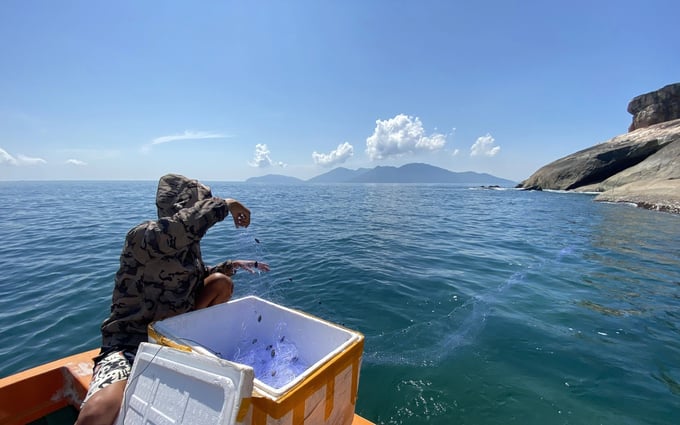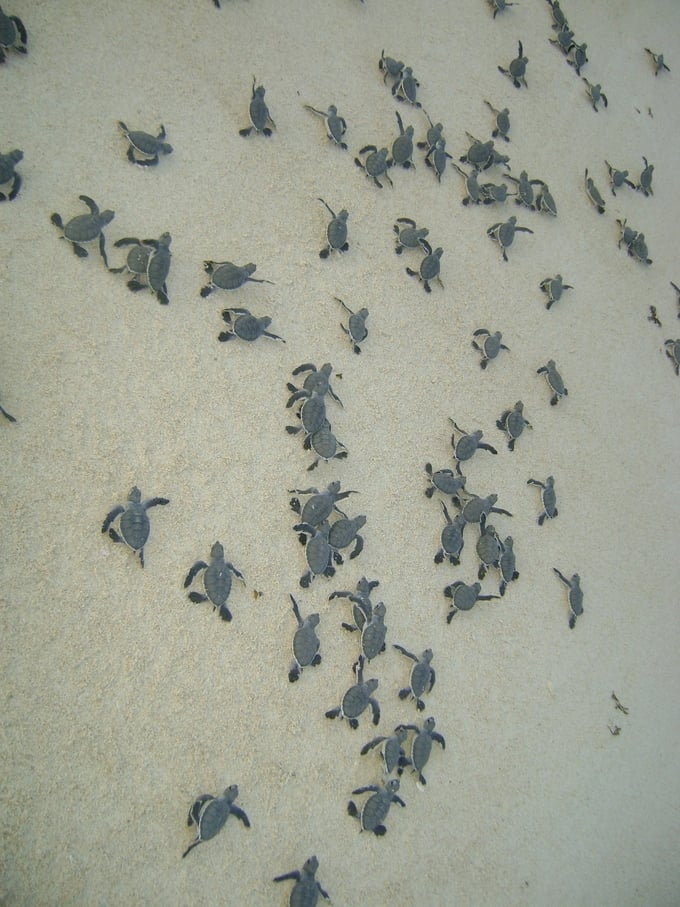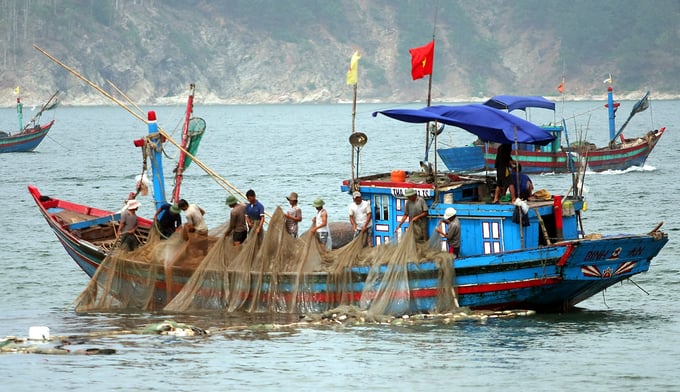May 19, 2025 | 13:42 GMT +7
May 19, 2025 | 13:42 GMT +7
Hotline: 0913.378.918
May 19, 2025 | 13:42 GMT +7
Hotline: 0913.378.918
The conservation of sea turtles and marine mammals in Vietnam has received considerable attention in recent years, as demonstrated by a number of programs, projects, and action plans. In addition to the aim of biodiversity conservation, Vietnam should advance a number of measures to manage and conserve aquatic resources, enhance fishery management capacity, and promote sustainable fishery trade in order to maintain its position as a leading exporter.
The program to conserve endangered turtle species in Vietnam until 2025, with a vision to 2030, which was approved by the Prime Minister in Decision No. 1176/QD-TTg dated September 12, 2019, is the legal basis for upcoming sea turtle conservation activities in Vietnam.
In Decision No. 811/QD-BNN-TCTS dated March 14, 2016, MARD published the National Action Plan for the Conservation of Vietnam's Sea Turtles from 2016 to 2025.

In addition to biodiversity conservation, Vietnam is moving towards implementing measures to manage and preserve aquatic resources and improve fisheries management capacity.
The agricultural sector has organized numerous turtle and marine mammal conservation programs and plans in Vietnam, received support from partners and international organizations, and continues to participate actively in this effort. Bilateral and multilateral dialogue to ensure timely updates on global marine biodiversity conservation trends and requirements.
In June of 2004, the Western and Central Pacific Fisheries Commission (WCPFC) was constituted. As of February 2020, the Committee consists of 26 official members, 11 participating territories, and eight non-member countries that cooperate, including Vietnam.
The Sea Turtle Conservation and Management Measure (CMM 2018-04) is the most recent measure implemented by WCPFC to address the impacts of fishing activities on sea turtles. It is developed in accordance with the FAO Guidelines to reduce sea turtle mortality in fishing activities and to ensure the safe disposal of all bycatch sea turtles, to improve the survival ability of sea turtles. This is also one of the outcomes of the WCPFC's 15th Annual Conference, building on the success of previous endeavors.
This measure seeks to reduce the unintentional exploitation of sea turtles in the Asia-Pacific region and promote their conservation and sustainable management. Specifically, CMM 2018-04 calls for highly coordinated action between international organizations and governments to propagate, support, and train fishermen to protect sea turtles.
For instance, if a sea turtle becomes entangled in fishing apparatus such as a net, personnel must immediately cease collecting the net. They must be equipped with the skills and materials necessary to rescue, rehabilitate, and release sea turtles in a safe manner. Fishermen are responsible for documenting and reporting all instances of marine turtle encounters during seafood harvesting.

The Sea Turtle Conservation and Management Measure (CMM 2018-04) is the latest measure implemented by WCPFC to address the impact of fishing activities on sea turtles.
MARD has implemented a series of activities to satisfy the WCPFC's requirements in order to assure its responsibility for implementing commitments as a non-member cooperating country. In addition to implementing Vietnam's Endangered Turtle Conservation Program, the Ministry has developed a draft Sea Turtle Rescue Procedure and will issue it for practical implementation in sea turtle rescue in localities throughout the country. Many scientists, research facilities, animal rescue groups, fishery communities, and international organizations are involved in the coordination of activities.
In particular, the Institute of Seafood Research (Ministry of Agriculture and Rural Development) has conducted research on the biological characteristics of marine turtles, enabling the effective implementation of protection and conservation measures such as turtle escape solutions for trawl nets. Simultaneously, evaluate the impact of offshore fishing on the sea turtle population in Vietnam.
In addition, the Ministry promotes local initiatives with the assistance and coordination of international and domestic non-governmental organizations, such as TRAFFIC, the World Wide Fund for Nature (WWF), and the United Nations. Animal Rights Organization (HSI), Vietnam Nature Education Center (ENV), International Union for Conservation of Nature and Natural Resources (IUCN), Vietnam Nature Education Center (ENV)... Consequently, practical initiatives have contributed to a greater awareness among fishermen, residential communities, pupils, and high school students.
In recent years, the work of protecting, preserving, salvaging, and releasing sea turtles has yielded numerous positive results due to the effective cooperation of management agencies, international organizations, and the community. In addition to in-depth seminars to raise awareness for people and society, research, monitoring, and training activities have assisted in the rescue of an average of over 100,000 sea turtle eggs per year (hatching rate of over 80%).
In addition, addressing violations of sea turtle protection strengthens maritime security by minimizing illegal hunting, transport, and trade of sea turtles and their products.
The United States is Vietnam's biggest export market for seafood. In 2022, the value of Vietnam's seafood exports to this market will exceed $2 billion, with tuna and other seafood accounting for nearly 50% of the total.
However, foreign seafood products that want to "knock on the door" of the US market need to satisfy many stringent requirements and standards, including the provisions of the US Marine Mammal Protection Act (MMPA).
Under the Marine Mammal Protection Act, enacted on October 21, 1972, all marine mammals are protected.
The MMPA was enacted to reduce marine mammal bycatch in fisheries exploitation activities and to establish export procedures for marine fish and marine fish products to the United States. Establishes criteria and procedures for evaluating the efficacy of programs implemented by countries exporting seafood to the United States to reduce marine mammal bycatch.

In fact, fisheries in Vietnam in particular and Southeast Asian countries in general are multi-species, small-scale fisheries, while fisheries in the United States and European countries are single-species.
Therefore, countries that export seafood to the United States are required to prohibit activities such as hunting, capturing, harassing, or harming marine mammals. Countries must also have regulations for the incidental capture of marine mammals during fishing activities; enforce regulations to protect marine mammal habitats and minimize negative human impacts on those habitats.
In addition, the United States requires seafood exporting countries to demonstrate that seafood production and capture methods comply with MMPA conservation standards; deploy monitoring and traceability systems to track the origin of seafood products from fisheries with the potential to interact with marine mammals; and minimize interactions with marine mammals. Legal documents, national action programs, research and investigation projects on marine mammals and those related to marine mammals must demonstrate the aforementioned content.
Noncompliance with the MMPA will result in a prohibition on seafood imports, resulting in significant economic consequences for exporting nations. If the Marine Mammal Protection Act (MMPA) is violated, the "door" for exporting exploitation-based seafood to this market will close.
With such requirements, countries exporting seafood to the U.S. confront a number of obstacles. In fact, fisheries in Vietnam in particular and Southeast Asian countries in general are multi-species, small-scale fisheries, while fisheries in the United States and European countries are single-species. In addition, countries in the region continue to struggle with accumulating marine mammal data, monitoring mechanisms, resources, techniques, and finances in order to manage their fisheries with "equivalent effectiveness" to that of the United States.
Translated by Dieu Linh

(VAN) 14 out of 35 domesticated elephants in Dak Lak province have had their living conditions improved, with 11 of them currently participating in the non-riding elephant tourism model.

(VAN) Muong Nhe Nature Reserve hopes that being upgraded to a national park will lay the foundation for forest protection efforts to be carried out in a systematic, modern, and sustainable manner.
/2025/05/16/3923-2-171845_52.jpg)
(VAN) Lower costs, higher yields, and improved soil quality are outstanding benefits that soybeans bring when integrated into the crop rotation system.

(VAN) The 'For a Green National Environment' programme aims to promote a green lifestyle, support businesses in implementing ESG practices, and turn Net Zero commitments into concrete actions.

(VAN) Cold-barn systems efficiently manage environmental and temperature conditions, which aids in the prevention of respiratory diseases in pigs and protects them from the vectors that transmit African swine fevers.

(VAN) To tackle challenges, the project 'Addressing key technical bottlenecks in the grouper supply chain in Vietnam' has been underway since 2024.

(VAN) The project 'Disease-Resilient and Sustainable Cassava Production Systems in the Mekong Region', funded by the Australian Center for International Agricultural Research (ACIAR), is being implemented from 2024 to 2028.